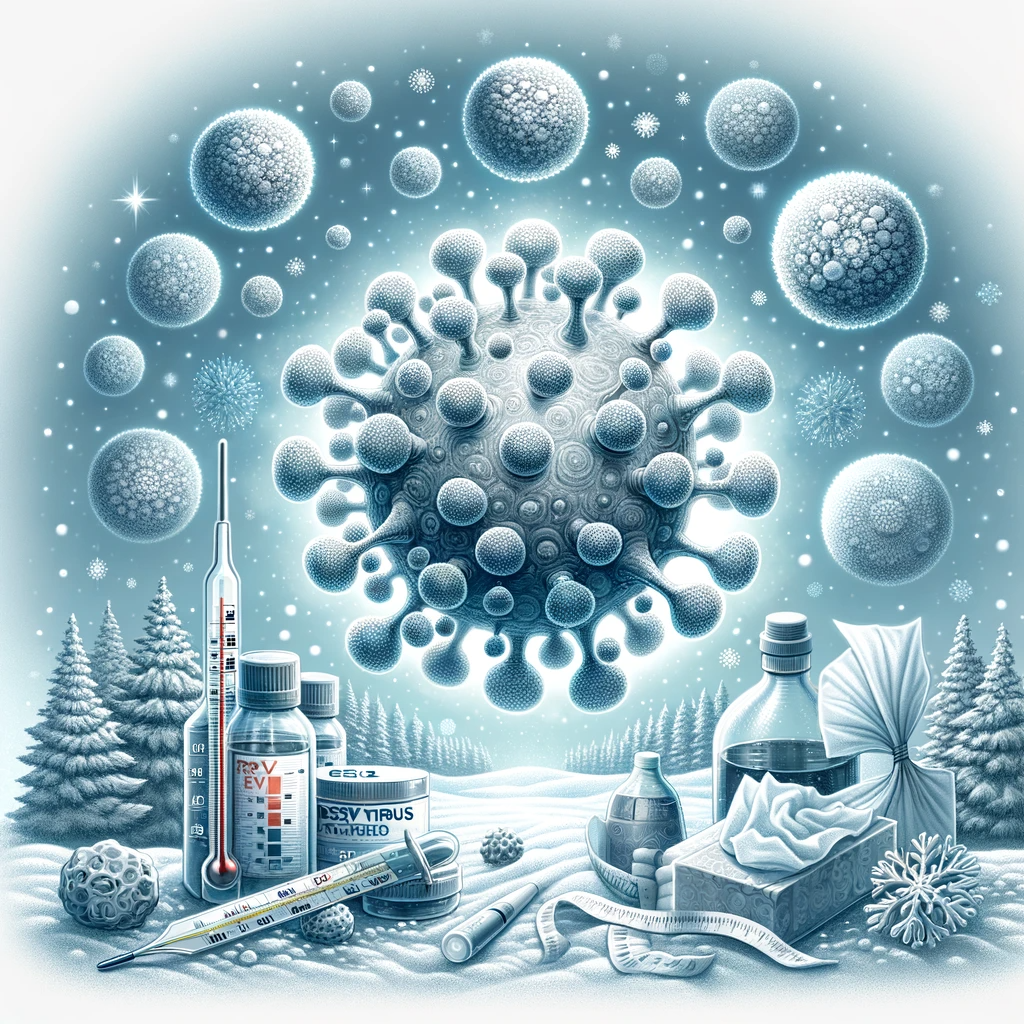Respiratory Syncytial Virus (RSV): Symptoms, Prevention, Treatment

RSV symptoms: Respiratory Syncytial Virus (RSV) is a common respiratory virus that can affect individuals of all ages, with most children experiencing it by age 2. While typically mild in adults and older children, RSV can cause severe complications in infants, older adults, and people with compromised immune systems. RSV typically follows a seasonal pattern, with outbreaks commonly occurring in fall, peaking in winter, and concluding in early spring. This seasonality is crucial for understanding the timing of preventative measures and heightened awareness.
Symptoms of RSV
Symptoms usually appear 4-6 days post-exposure, presenting as mild cold-like symptoms in adults and older children, such as:
RSV Symptoms in Kids:
- Rapid, shallow breathing
- Difficulty in breathing, indicated by chest retractions
- Persistent coughing or wheezing
- Poor feeding and decreased activity
- Irritability and unusual tiredness (lethargy)
RSV Symptoms in Adults:
- Congested or runny nose
- Dry cough
- Low-grade fever
- Mild sore throat
- Sneezing
- Headache
Older Adults:
- Similar symptoms to adults, but with higher risk of severe complications
- Increased breathing difficulties
- Higher risk of developing pneumonia or bronchitis
- Potential cyanosis (bluish color of the skin due to lack of oxygen
Transmission and Risk Factors for RSV
RSV is highly contagious through respiratory droplets. Young children, especially in childcare, and adults over 65, or those with chronic health conditions are at higher risk.
Prevention and Protection
Effective prevention during virus season includes:
- Regular handwashing.
- Avoiding close contact with sick individuals.
- Disinfecting surfaces.
- Not sharing utensils and cups.
- Maintaining smoke-free environments.
- Cleaning toys frequently.
Vaccination and Protective Measures
- During Pregnancy: Vaccination in late pregnancy is recommended to provide passive immunity to the infant.
- Infants: Specific vaccination protocols are in place for young infants, particularly those at high risk or born during RSV season.
- Older Adults: Vaccination for older adults, especially those with chronic health conditions, to reduce the risk of severe RSV complications.
Vitality Urgent Care’s Role in RSV Management
Vitality Urgent Care is essential in managing Respiratory Syncytial Virus (RSV), particularly during peak seasons. Our services include:
- Rapid Testing: We provide quick and accurate RSV testing, crucial for timely diagnosis and distinguishing RSV from similar respiratory illnesses like flu and COVID-19.
- Age-Specific Treatment: Understanding that RSV impacts different age groups uniquely, Vitality Urgent Care offers tailored treatment plans. These are based on patient’s age, severity of symptoms, and individual health needs.
- Preventive Guidance: The care team also advises on managing symptoms at home and preventive measures to curb the spread of RSV. This includes hygiene practices, avoiding contact with infected individuals, and recommendations for household safety. Recognizing RSV symptoms and implementing prevention methods is vital for protecting vulnerable groups. Vitality Urgent Care plays a crucial role in providing rapid testing and treatment guidance, ensuring the best care for those at risk of RSV.
Latest Blog Posts:
- The Cost of X-Rays: Urgent Care vs. Emergency Room
- Exciting News: Vitality Urgent Care is Relocating to a New, State-of-the-Art Facility!
- Respiratory Syncytial Virus (RSV): Symptoms, Prevention, Treatment
- The ABCs of Concussions: A Parent’s Guide for School Sports Safety
- Navigating Through Common Summer Rashes
- Emergency Department or Urgent Care Center?
- Nausea from stomach bug or food poisoning?
- Health Tips from Vitality Urgent Urgent Care
- Sunburn Treatment Made Simple
- Get your children outside!
- Common Skin Rashes in Children
- Telemedicine or Virtual Health on Demand
- Halloween Safety from Vitality Urgent and Primary Care
- How to Recognize the Symptoms of a Urinary Tract Infection
- Is it already the Influenza (Flu) season?
- Why Urgent Care at Home
- Allergies – Nose, Eyes, Skin or Other
- Sore Throat or Elusive Strep
- What the Research Says About the Impact of House Calls on Patients